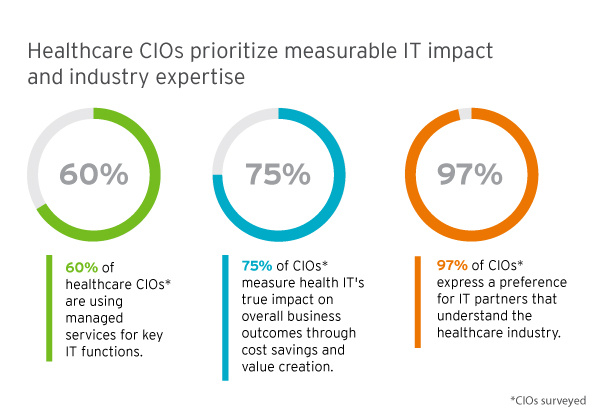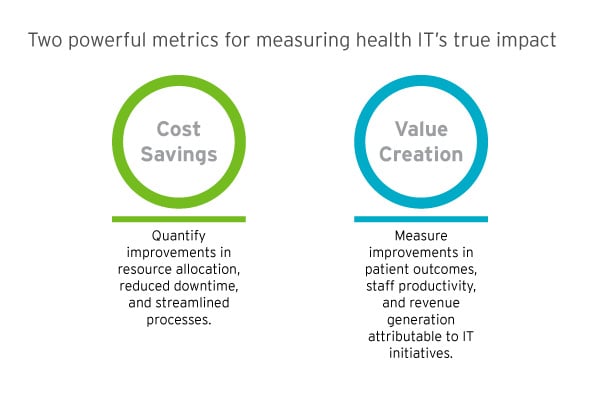Nordic recently partnered with the College of Health Information Management Executives (CHIME) to survey chief information officers (CIOs) about the current state of managed services in healthcare. These valuable insights, from leaders who oversee the people, processes, and technologies within U.S. healthcare organizations of all sizes, revealed three key findings about the transformative role of digital tools in modern healthcare.
Embracing specialized expertise
The healthcare landscape has changed significantly in recent years, accelerated by the global pandemic. In a post-pandemic world, healthcare providers recognize their IT solutions must drive innovation and support new models of care delivery.

Of the CIOs surveyed, 60% are now using managed services for key IT functions, primarily to “access specialized expertise” and allow for “scalability and flexibility.” This trend signals a change in how healthcare leaders view their IT capabilities.
By partnering with external experts, healthcare organizations can access cutting-edge skills and technologies without developing them internally. This approach offers greater agility in adapting to changing requirements and can potentially reduce overall IT spend.
Forward-thinking healthcare leaders are reimagining IT’s role, elevating it from an operational necessity to a strategic enabler of organizational goals. This shift in perspective is crucial for scaling IT capabilities to meet long-term needs and drive value across the enterprise.
Measuring impact: the dual focus on cost savings and value creation
In 2024, healthcare IT leaders face the challenge of maximizing budgets while demonstrating the strategic value of IT investments. The survey found 75% of respondents measure IT’s impact on overall business outcomes through cost savings and value creation.
Despite financial challenges, Gartner® reports that 46% of organizations expect their IT budgets to remain flat or decrease in 2024, this constraint presents an opportunity for IT leaders to optimize spending and deliver greater business outcomes. By reframing health IT as a strategic asset, organizations can unlock significant benefits, such as:
- Improved clinical outcomes: Strategic IT investments can enhance the quality and efficiency of patient care.
- Enhanced patient experiences: Technology-driven improvements in service delivery and communication can boost patient satisfaction.
- Financial sustainability: While upfront costs can be substantial, IT investments often lead to long-term cost efficiencies and new revenue growth opportunities.
Leveraging managed services for balanced growth
The strategic use of managed services emerges as a key approach to balance cost-saving imperatives with value creation:
- Operational efficiency: Outsourcing routine IT functions can reduce operational costs and free up internal resources for strategic initiatives.
- Access to expertise: Managed services providers offer advanced skills and technologies without the burden of in-house development.
- Scalability: As organizational needs evolve, managed services offer the flexibility to adjust IT capabilities quickly.
The need for healthcare-savvy IT partners
The survey underscores the importance of IT partners who understand the healthcare industry, with 97% of respondents expressing a preference for such partners. This preference is understandable given the long partner relationship and complex nature of healthcare IT solutions, which must navigate regulatory requirements, ensure compliance with privacy standards, and integrate into clinical workflows.
Partners with deep industry knowledge offer several advantages:
- Tailored solutions: They can provide customized IT solutions that address healthcare-specific challenges.
- Regulatory compliance: These partners stay informed about the changing regulatory landscape, ensuring technology implementations meet compliance standards.
- Workflow integration: Understanding clinical workflows allows these partners to implement solutions that enhance existing processes.
- Industry foresight: They can help organizations prepare for future challenges and opportunities, such as the shift towards value-based care models.
- Collaborating with organizations that understand healthcare enables providers to reduce implementation risks, align technology investments with clinical goals, and improve patient outcomes.
Successful healthcare IT strategies in 2024 and beyond will be built on specialized expertise, strategic partnerships, and a focus on delivering measurable value. By embracing these principles, healthcare organizations can turn their IT investments into drivers of organizational success and improved patient care.

